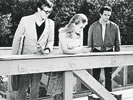Eye For Film >> Movies >> Lilith (1964) Film Review
Both writer and director of Lilith, the picture was destined to be the last work of Robert Rossen whose most prolific success came in the shape of The Hustler in 1961, starring Paul Newman and Jackie Gleason. Along with All the King’s Men, in 1949, the director had enjoyed great success which probably explains how this rather indiscernible and often frustrating picture came to be.
Lilith stars Warren Beatty as Vincent Bruce, a troubled ex-soldier who, on returning home, takes a counselling position at a local mental hospital. It is in the confines of the exclusive institute that he meets Lilith Arthur (Jean Seberg) an enigmatic and troubled soul with whom he becomes increasingly infatuated. Under the guise of Kim Hunter’s Dr Bea Brice, Vincent is encouraged to spend more and more time with the patient - and he eventually falls hopelessly in love with her. Any pretence of ethics goes out the window as he breaks every rule to fuel his obsession.

Having spent so much time with her Vincent is eventually praised for making a break-through with the young girl but it comes at a great price. Seberg is wonderful in the titular role, at once possessing Vincent utterly and yet retaining an aspect of fragile vulnerability. Throughout the picture she is a continual contrast between predator and prey, leading Vincent further and further into her own strange world. She even flaunts a supposedly amorous tryst with another female patient at Vincent in order to further disturb and provoke his unstable emotions. It is this instability that typifies Beatty’s turn as the young ex-soldier, who is surly in the extreme, founding the performance on the pretext that Vincent is as disturbed as Lilith if not more.
The story moves along somewhat awkwardly and some scenes seem a little superfluous such as when Vincent attempts to rekindle an old love interest in the form of Laura (Jessica Walter). We find Vincent loitering around her house before bumping into her husband played by the then blossoming talent of Gene Hackman.
The clear highpoint of Lilith is Seberg’s performance which carries the picture along nicely, coupled with the often sublime photography of Eugen Schüfftan. At the time, Hollywood had a fairly caustic regard for what was deemed to be ‘arty’ or exotic filmmaking but Schüfftan succeeds in injecting some much needed flair in the cinematography department. A particular scene where Lilith wades into a pond before dipping down to kiss her own reflection in the waters surface stands out as a joy to behold.
The story stutters along as Vincent becomes increasingly unhinged, plunged ever deeper into the Lilith’s disturbed world. The climactic scenes are somewhat predictable and, although the picture as a whole is enjoyable, it sadly fails to reach the lofty peaks of Rossen’s earlier works.
Reviewed on: 08 Sep 2008


















